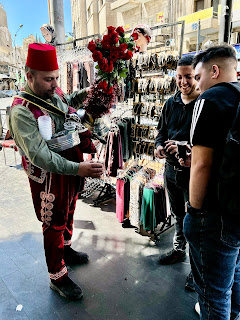 |
| A juice vendor in downtown Amman |
Leaving our hotel with just a few hours sleep after a late-night flight from London, my husband, Tom, and I stepped out onto the streets of Jabal al-Weibdeh, a gentrifying hillside neighborhood in Amman, the capital of Jordan.
The minaret next to a blue-domed mosque towered over neat rows of sandstone-colored houses and apartments. Cafe owners dusted off their patio tables. Springtime flowers bloomed in sidewalk gardens.
It was just 9 a.m. but already warm and sunny. We were headed out for a walking tour in downtown Amman - the oldest part of one of the oldest cities in the world - when I spotted a corner store. Before I could ask, the man behind the counter pointed to a cooler filled with bottled water.
 |
| "Welcome, welcome," said the owner of our neighborhood store |
“Small, small,” he smiled, holding up a coin - the Jordan dinar equivalent of around 25 cents - indicating he couldn’t make change from the large bill I offered.
“No problem. Free for you,” he said, refusing my offer to pay him later in the day. “Welcome, welcome.”
And so began our first day in Amman, a city continuously inhabited for 7,500 years, yet the capital of a country that only gained its independence from the British 77 years ago.
Located between Mecca, the holiest place on earth for Muslims, and Jerusalem, Jordan has played a central role in the history of the Old Testament (Moses and Abraham walked here); the Bible (St. John the Baptist baptized Jesus in the Jordan River); and the Quran.
Yet while almost everyone is familiar with Petra, Jordan's major archeologic site; Wadi Rum, a desert valley area popular with rock climbers and hikers; and the experience of floating in the Dead Sea, few stay in Amman long enough to appreciate the most liberal city in the Arab world, and likely the most diverse.
 |
| Women who wear head scarves wear them in style |
Bordering Syria, Iraq, Saudi Arabia, the Palestinian territories and Israel, Jordan is predominantly Muslim with a large Palestinian population. It also has a significant Christian population, so it's not unusual to hear the Call to Prayer at a local mosque and church bells ringing at the same time. Cafes stock beer and wine for those who drink alcohol, and tea and shisha pipes for those who abstain. Head scarves for women are optional. Call it Middle-East Lite. Amman provides a soft landing for first-time visitors in the Arab world.
 |
| The Temple of Hercules |
With 4.5 million people, Amman's city limits stretch far beyond the original old city built on seven hills or jabals. Towering over everything is the ancient Citadel with the ruins of the Roman Temple of Hercules and the Umayyad Palace complex built during the 8th century on the foundation of a Byzantine church. Next door is the Amman Citiadel mosque with a restored domed entrance chamber.
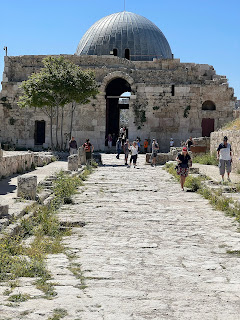 |
| The Amman Citadel Mosque |
 |
| The original mosque is believed to have had a wooden dome, like this one which was constructed towards the end of the 20th century. |
Downhill and a five-minute- walk to downtown are the remains of a 2nd-century Roman theater when the city was known as Philadelphia. The theater is still used for sporting and cultural events.
Getting around foot requires a steep climb up or down connecting staircases, often hidden from view but marked on Google maps.
 |
| Stairs to downtown |
 |
| A street decorated with colorful lanterns |
Using as our base the Locanda Boutique Hotel, a cultural project where the names of well-known Arabic musicians replace room numbers, we devoted our time to exploring Al-Balad, the Arabic name for the old downtown and Jabal-al-Weidbdeh, the cultural heart of Amman, with its art galleries, museums and vibrant cafe life.
 |
| Downtown bookshop |
Around town with Osama
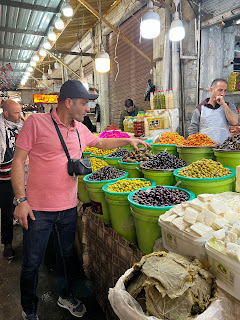 |
| Osama explains the many varieties of olives for sale in the vegetable souq |
Nine of us - all strangers before today - follow our guide, Osama, as he leads us across a busy street, stopping traffic by holding out his left hand. We’ve signed up for his “Taste of Amman Free Food Tour” through GuruWalk.com, a clearing house for locals who create walking tours in cities throughout the world. Tips are encouraged, but there’s no obligation and no set prices.
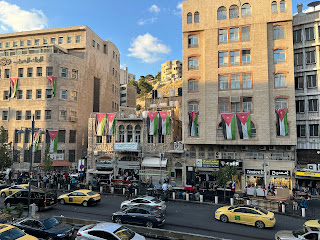 |
| Downtown Amman |
 |
| One of many downtown murals |
We'll soon be weaving in and out of the souqs - an ancient labyrinth of covered markets for fruits, spices, vegetables and clothes. But first we stop in front of a mural depicting a face divided vertically down the middle, half male and half female. It's a statement about equality among the sexes in a commercial area lined with shops all run by men.
This mural and many others like it painted on the walls of businesses and buildings around Amman are meant to encourage dialogue on gender issues Some of it is aimed at correcting a mismatch between attitudes towards women working (90 percent of men and women approve) and the low percentage of women (14 percent) in the workforce.
Female literacy rates are among the highest in the Middle East, and more women than men are enrolled in college. But leaving children with a relative in order to to work is still considered unacceptable as is having a job that requires late hours and time away from a family.
“We don’t have oil,” Osama explains. “So we need to invest in human beings.”
Our first stop is the oldest bakery in Amman where fresh loaves are stacked under a sign written in Arabic. Then we plunge deep into the crowded souqs stocked with vegetables we don’t easily recognize and shops where bins are piled with artfully displayed spices, teas, olives and almonds.
 |
| Spice souq |
 |
| Watermelons for sale: $1.50 |
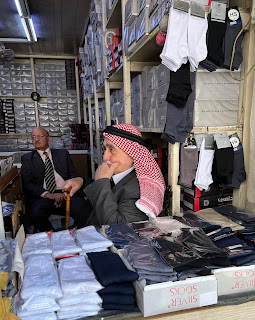 |
| Socks and underwear salesmen |
 |
| Za'atar sandwich on the terrace of Dar Al-Anda |
At the bottom of those steps, we take special note of the location of Habibah sweet shop across the street. The specialty is Kunafa, a layered dessert with a base stringy cheese similar to a mozzarella and the top layers of vermicelli soaked in rose scented sugar syrup. Clerks in white coats cut slabs from a pizza-size pan, weigh the slices, and charge accordingly.
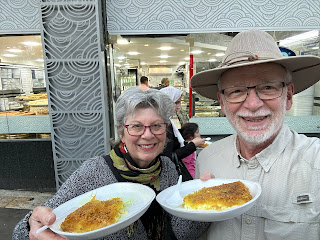 |
| Kunafa at Habibah sweet shop |
After two-and-a-half hours of waking and a stop for bottles of Jordanian beer to-go, Osama leads us up a long flight of stairs to his home where he has prepared lunch for our group. This part of his tour was not advertised on the Guruwalk website. Rather he informed us in an e-mail after we signed up that lunch would be included. Dietary issues forced him to learn to cook healthy foods at a young age, he explained. Those skills led to a job as a chef at a hotel in Petra before he became a freelance guide.
As we take places around his dining table, he retreats to his kitchen, and reappears with appetizers called mezze- bowls of homemade hummus, yoghurt, baba ganoush, a peasant salad called fatoosh and baskets of pita bread. Restaurants all over Amman serve their own versions of these dishes. Guidebooks point visitors to a crowded downtown spot called Hashem, but Osama's recipes are better, and there's no wait for a table.
We could have made a meal of the mezze, but there was a main dish to come, and one Osama was very proud to have mastered. It's Maklouba, a dish found a 13th century collection of Arab recipes, popular throughout the Middle East.
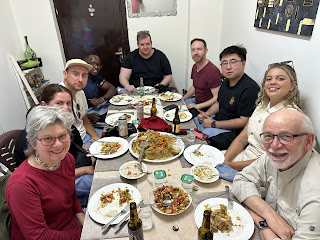 |
| Our walking group at lunch |
Vegetables such as carrots and peppers and chicken or lamb are folded into a mixture of rice and 13 spices. It's all piled into a pot and cooked over the stove, then tipped upside down on a plate revealing the layers of chicken, rice and vegetables.
Osama brings the pot to a side table, inverts a perfectly intact Maklouba, then places the platter in the middle of the table for us all to devour.
"Welcome, welcome," he says. We remember what he said earlier about investing in people, and leave a generous tip.
 |
| Osama inverts his Maklouba |

No comments:
Post a Comment